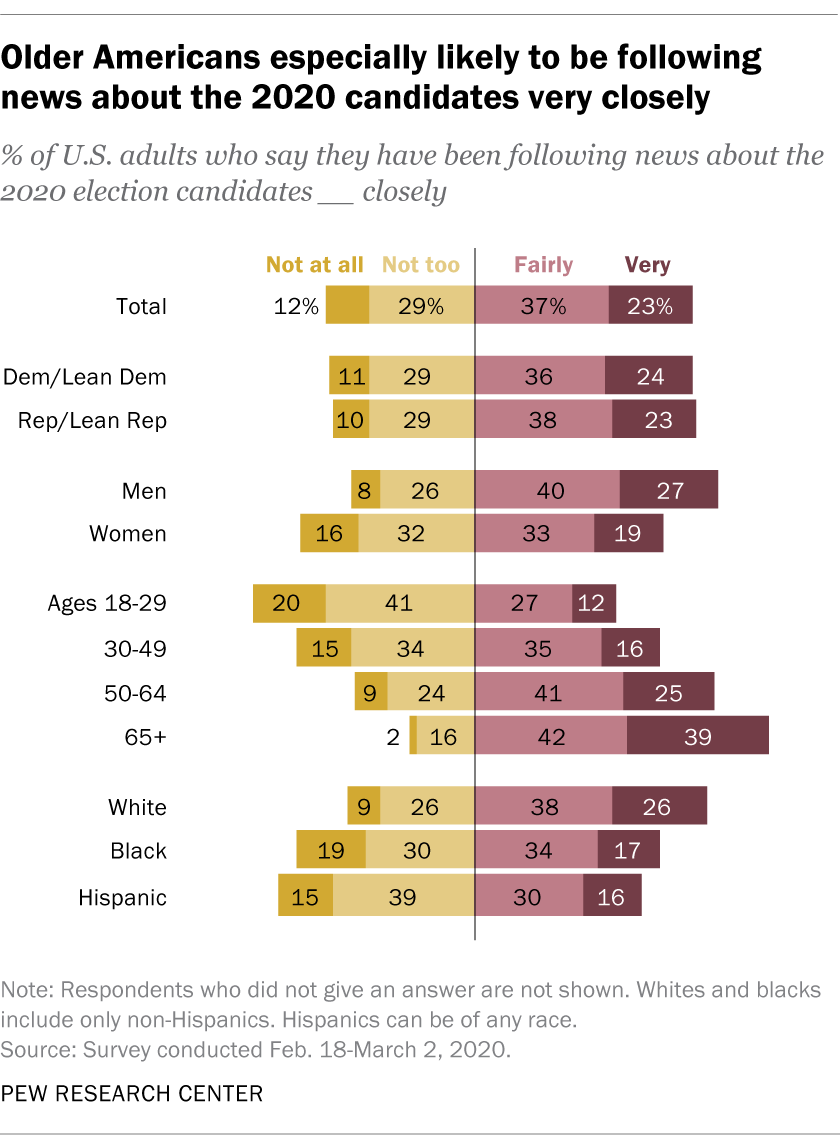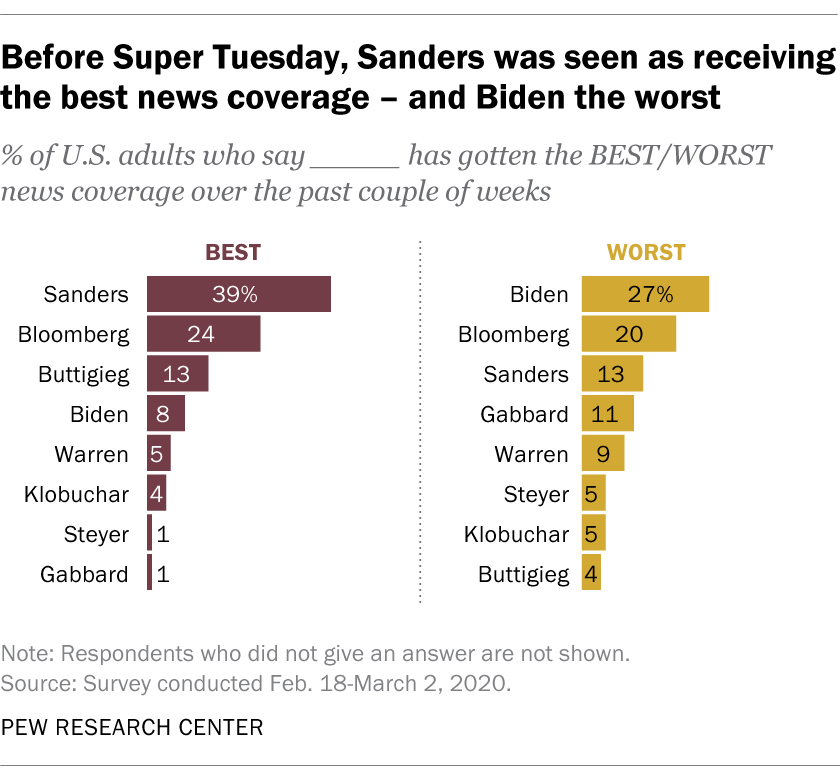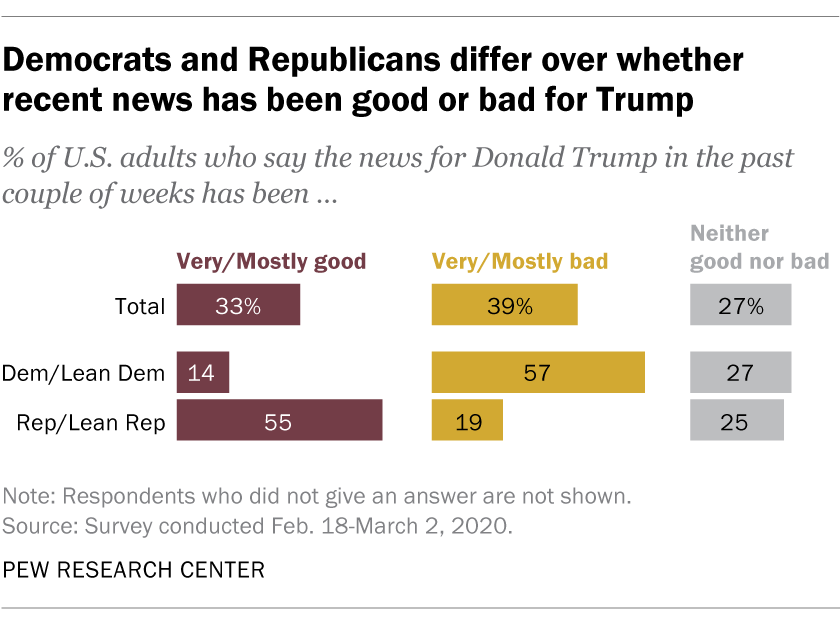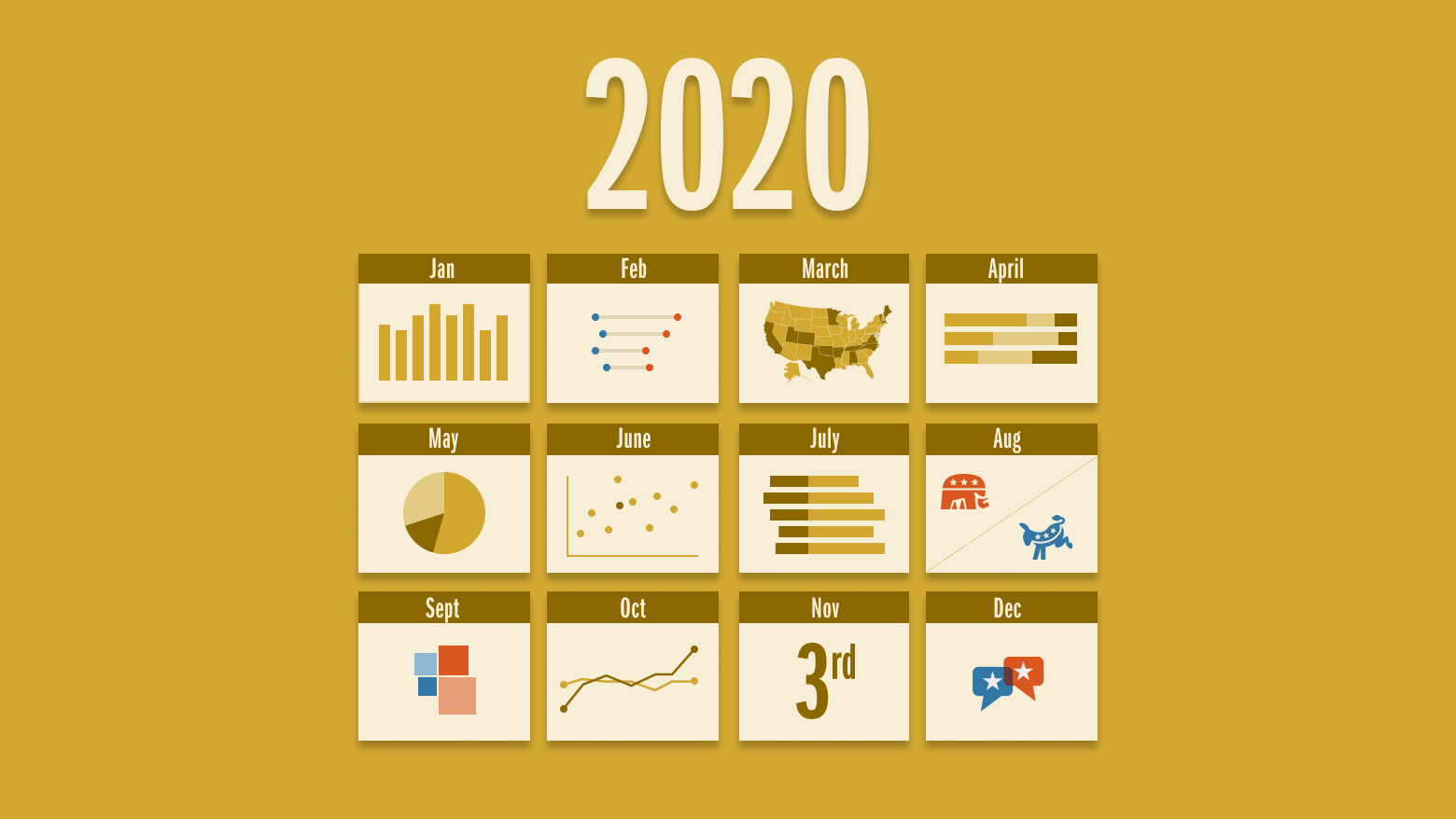The Democratic presidential primary field has narrowed substantially following the first several contests, and Donald Trump is ramping up his reelection campaign after being acquitted in his Senate impeachment trial in February. So how have Americans been navigating the torrent of election news they’ve encountered so far in 2020?
A new Pew Research Center survey, conducted Feb. 18-March 2, examines what Americans have heard and think about a host of election-related topics, from Trump’s acquittal in the Senate to the (rapidly shrinking) field of Democratic presidential contenders to the spread of made-up news. We’re releasing the full survey data today in our interactive data tool.
[callout align=”alignright”]
Want to keep up with trends shaping the 2020 U.S. presidential election?
Sign up to receive our monthly newsletter.
[/callout]
The tool is part of the Center’s Election News Pathways project, a nearly yearlong initiative focused on what Americans hear, perceive and know about the election and how these attitudes relate to how and where they get news. This survey is the second of at least seven polls of about 10,000 U.S. adults that we’re fielding between November 2019 and October 2020 for this project. We plan to upload the data from each one directly into the tool for you to explore.
Below are five noteworthy findings from the new poll. Keep in mind that these represent just a small sampling of the kinds of findings you can unearth with the tool, so we encourage you to explore the interactive in more detail yourself.
How we did this
To find out how Americans are navigating the news ahead of the 2020 election, we surveyed 10,300 U.S. adults from Feb. 18-March 2 – the second survey in the Center’s nearly yearlong Election News Pathways project.
Everyone who took part is a member of Pew Research Center’s American Trends Panel, an online survey panel that is recruited through national, random sampling of residential addresses. Recruiting our panelists by phone or mail ensures that nearly all U.S. adults have a chance of selection. This gives us confidence that any sample can represent the whole population (see our Methods 101 explainer on random sampling). To further ensure that each survey reflects a balanced cross section of the nation, the data is weighted to match the U.S. adult population by gender, race, ethnicity, partisan affiliation, education and other categories.
Here are the questions asked for this report, along with responses, and its methodology.
[bignumber]Most Americans (59%) are following the news about the 2020 candidates closely, but far fewer (23%) are following it very closely at this stage of the race.  Even though there is a contested nomination race on the Democratic side, Democrats and Democratic-leaning independents are no more likely than Republicans and GOP leaners to say they’re following the news about the candidates closely. Six-in-ten Democrats (60%) say they’re following it closely, including 24% who are following it very closely. That compares with 61% of Republicans, including 23% who are following it very closely.
Even though there is a contested nomination race on the Democratic side, Democrats and Democratic-leaning independents are no more likely than Republicans and GOP leaners to say they’re following the news about the candidates closely. Six-in-ten Democrats (60%) say they’re following it closely, including 24% who are following it very closely. That compares with 61% of Republicans, including 23% who are following it very closely.
Americans ages 65 and older are about three times as likely as adults under 30 to say they’re following the news about the candidates very closely (39% vs. 12%). And white adults (26%) are more likely than black and Hispanic Americans to say this (17% and 16%, respectively).
[bignumber] Around a third of Americans (32%) believe there were major efforts to purposefully delay the results of Iowa’s Democratic caucuses in February. This is only slightly lower than the share of U.S. adults who believe there were unintentional problems that caused delays, but not major efforts to purposefully delay the results (39%).
Republicans are more likely than Democrats to say there were efforts to purposefully delay the results of the Iowa caucuses (41% vs. 25%). Democrats are more likely than Republicans to say there were unintentional problems, but no intentional efforts to delay the results (47% vs. 33%).
 [bignumber] In the weeks before Joe Biden’s strong performance in South Carolina and on Super Tuesday, Americans considered him the Democratic presidential candidate with the worst recent news coverage. Around a quarter of U.S. adults (27%) said Biden had received the worst news coverage in the weeks leading up to the survey. Smaller shares said this about Michael Bloomberg (20%), Bernie Sanders (13%), Tulsi Gabbard (11%) and the other candidates. Republicans were slightly more likely than Democrats to say Biden had received the worst news coverage (31% vs. 25%).
[bignumber] In the weeks before Joe Biden’s strong performance in South Carolina and on Super Tuesday, Americans considered him the Democratic presidential candidate with the worst recent news coverage. Around a quarter of U.S. adults (27%) said Biden had received the worst news coverage in the weeks leading up to the survey. Smaller shares said this about Michael Bloomberg (20%), Bernie Sanders (13%), Tulsi Gabbard (11%) and the other candidates. Republicans were slightly more likely than Democrats to say Biden had received the worst news coverage (31% vs. 25%).
As for which Democratic candidate had received the best news coverage, the largest share of Americans pointed to Sanders (39%). Considerably smaller shares said this about Bloomberg (24%), Pete Buttigieg (13%), Biden (8%) and other candidates. On this question, around four-in-ten Democrats as well as Republicans said Sanders had received the best coverage (41% and 37%, respectively).
Of course, perceptions about the positivity or negativity of the news coverage surrounding each candidate are likely related to that candidate’s performance in the early presidential caucus and primary states. Sanders had strong showings in Iowa, New Hampshire and Nevada, while Biden’s commanding victory in South Carolina didn’t happen until Feb. 29, near the end of the survey’s field period.
[bignumber] Most Americans say they followed Trump’s impeachment proceedings closely. Around six-in-ten Americans (59%) say they followed the news about Trump’s impeachment and trial closely, but only 24% followed it very closely.
Democrats and Republicans are about equally likely to say they followed the news about Trump’s impeachment and trial closely (60% vs. 62%), including similar shares who followed it very closely (24% vs. 26%). Older people are much more likely than younger people to say they followed it very closely, while white adults are slightly more likely than black and Hispanic adults to say this.
 [bignumber] Partisans have nearly opposite perspectives on whether the news of the past few weeks has been good for Trump or bad for him. A 55% majority of Republicans say the news over the past couple of weeks has been very or mostly good for the president, while a 57% majority of Democrats said it has been very or mostly bad for him. (The survey was mostly conducted before concerns over the coronavirus escalated in the United States.)
[bignumber] Partisans have nearly opposite perspectives on whether the news of the past few weeks has been good for Trump or bad for him. A 55% majority of Republicans say the news over the past couple of weeks has been very or mostly good for the president, while a 57% majority of Democrats said it has been very or mostly bad for him. (The survey was mostly conducted before concerns over the coronavirus escalated in the United States.)
There are even wider differences on this question when looking at Americans’ main source for political news. For example, 68% of those who cite Fox News as their main source say the news over the past few weeks has been very or mostly good for Trump. Among those who say their main source is MSNBC, 70% say the news has been very or mostly bad for him.
Are you interested in doing your own analysis of the data in our new survey? Besides getting it through the data tool, you can access it through our API or download the full dataset here. (You’ll need to create an account first. You can find more details about how to download Pew Research Center datasets in this blog post.) We’ll be updating the tool and datasets regularly throughout the year with findings from future polls.
Here are the questions asked for this report, along with responses, and its methodology.

